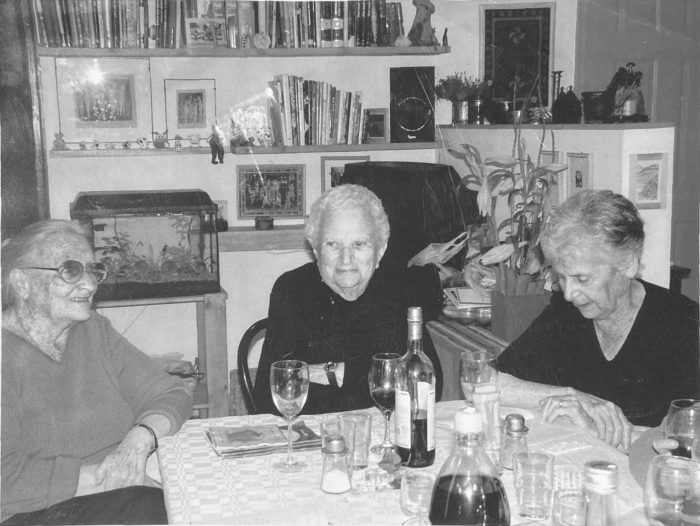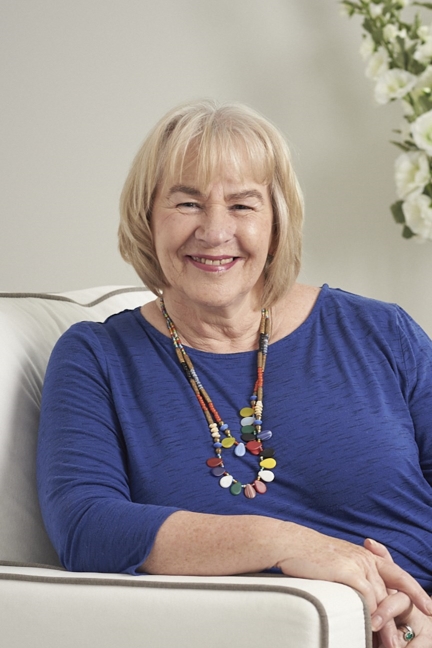Inspired by a true story, Three Sisters follows the journey of Livia, Magda, and Cibi as they confront the traumas endured after years of imprisonment in Auschwitz and find true peace in their futures. Read on for a note from the author, Heather Morris, and a sneak peek of the novel.
A Note from Heather Morris
 resized
resized
I am truly humbled to be writing the story of the Three Sisters, Cibi, Magda, and Livia, and their heartbreaking and uplifting tale of survival, against the odds. I thank Livi and Magda for trusting me, and for taking the time, over so many hours, to tell it to me. I’m sad that I never met Cibi, but I thank the families of all three sisters, I think I’ve met most of them, for welcoming me into the family, supporting and guiding me as I write.
I was initially contacted by Oded, the son of Livia, who lives in Canada. He picked up a copy of The Tattooist of Auschwitz at Toronto Airport on his way to visit Livia in Israel. When he handed it to Livia, she said straight away, ‘That is Gita’s story. I knew them in Auschwitz—I was at school with Gita.’ From this simple act, picking up a book in an airport, the story of the Three Sisters will be told. I have been to Israel twice since Oded wrote to me, each time staying for a week and spending every day with the two surviving sisters, Livi and Magda and their families, as well as Cibi’s family.
I have watched the Shoah testimonies of Cibi and Livi and read translated versions. I am yet to learn Hebrew, but I didn’t need to understand what Cibi was saying. Watching her, I knew who she was: a woman of incredible strength and passion, a woman determined to look after her two younger sisters, to ensure that the three of them survived, so that they could go on to live wonderful, full lives. I have also carried out extensive research into their story and the plight of the Jewish people from Slovakia and been given access to the research department at Yad Vashem Holocaust Museum in Jerusalem.
Chapter 1
Vranov nad Topl’ou
March 1942
Please tell me she’s going to be all right, I’m so worried about her,” Chaya frets, as the doctor examines her seventeen-year-old daughter.
Magda has been struggling with a fever for days.
“Yes, Mrs. Meller, Magda will be fine,” Dr. Kisely reassures her. The tiny bedroom contains two beds: one in which Chaya sleeps with her youngest, Livi; and the other, which Magda shares with their older sister, Cibi, when she is home. A large cabinet takes up one wall, cluttered with the small, personal possessions of the four women of the house. Taking pride of place: the cut-glass perfume atomizer with its emerald green tie and tassel, and next to it a grainy photograph. A handsome man sits on a simple chair, a toddler on one knee, an older girl on the other. Another girl, older yet, stands to his left. On his right is the girls’ mother, her hand resting on her husband’s shoulder. Mother and daughters wear white lacy dresses and together they are a picture-perfect family, or, at least, they were.
When Menachem Meller died on the operating table, the bullet finally removed but the blood loss too great to survive, Chaya was left a widow and the girls fatherless. Yitzchak, Chaya’s father and the sisters’ grandfather, moved into the small cottage to offer help where he could, while Chaya’s brother, Ivan, lives in the house across from theirs.
Chaya is not alone, despite how she feels.
The heavy drapes are drawn in the bedroom, denying Magda, shivering, feverish, the brilliant spring sunshine which now peeks above the curtain rail.
“Can we talk in the other room?”
Dr. Kisely takes Chaya’s arm. Livi, cross-legged on the other bed, watches Chaya place another wet towel on Magda’s forehead.
“Stay with your sister?” her mother asks, and Livi nods.
When the adults leave the room Livi crosses to her sister’s bed and lies down beside her, proceeding to wipe the perspiration from Magda’s face with a dry flannel.
“You’re going to be OK, Magda. I won’t let anything happen to you.”
Magda forces a small smile. “That’s my line. I’m your big sister, I look after you.”
“Then get better.”
Chaya and Dr. Kisely walk the few steps from the bedroom to the main room in the small house. The front door opens directly into this cozy living area, with a small kitchen area at the back.
The girls’ grandfather, Yitzchak, stands washing his hands at the sink. A trail of wood shavings has followed him from the backyard, and more lie on the faded blue felt that covers the floor. Startled, he turns, splashing water onto the floor. “What’s going on?” he asks.
“Yitzchak, I’m glad you’re here, come and sit with us,” says Dr. Kisely.
Chaya quickly turns to the young doctor, fear in her eyes. Dr. Kisely smiles and guides her to a kitchen chair, pulling another away from the small table for Yitzchak to sit.
“Is she very unwell?” Yitzchak asks.
“She’s going to be fine. It’s a fever, nothing a healthy young girl can’t recover from in her own time.”
“So what’s this about?” Chaya waves a hand between the doctor and herself.
Dr. Kisely finds another chair and sits down. “I don’t want you to be scared by what I’m about to tell you.”
Chaya merely nods, now desperate for him to tell her what he needs to say. The years since the war broke out have changed her: her once smooth brow is lined, and she is so thin her dresses hang off her like wet laundry.
“What is it, man?” Yitzchak demands. The responsibility he bears for his daughter and grandchildren has aged him beyond his years, and he has no time for intrigue.
“I want to admit Magda into hospital—”
“What? You just said she was going to get better!” Chaya explodes. She stands up, grabbing the table for support.
Dr. Kisely holds up a hand to shush her. “It’s not because she’s ill. There’s another reason I want to admit Magda and if you will listen, I’ll explain.”
“What on earth are you talking about?” Yitzchak says. “Just spit it out.”
“Mrs. Meller, Yitzchak, I am hearing rumors, terrible rumors—talk of young Jews, girls and boys, being taken from Slovakia to work for the Germans. If Magda is in hospital, she will be safe, and I promise I won’t let anything happen to her.”
Chaya collapses back onto her chair, her hands covering her face. This is much worse than a fever.
Copyright © 2021 by Heather Morris
 resize
resize
Heather Morris is a native of New Zealand, now resident in Australia. For several years, while working in a large public hospital in Melbourne, she studied and wrote screenplays, one of which was optioned by an Academy Award-winning screenwriter in the US. In 2003, Heather was introduced to an elderly gentleman who ‘might just have a story worth telling’. The day she met Lale Sokolov changed both their lives. Their friendship grew and Lale embarked on a journey of self-scrutiny, entrusting the innermost details of his life during the Holocaust to her. Heather originally wrote Lale’s story as a screenplay – which ranked high in international competitions—before reshaping it into her debut novel, The Tattooist of Auschwitz.
